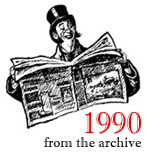
The Church in Tension with a Lockean Culture
ON AUTHORITY IN RELIGION
Ed. Note: The following remarks were presented to the U.S. Roman Catholic bishops on June 23, 1990, at their special assembly at the University of Santa Clara.
It is a great honor for me as an Episcopalian layman to address your 1990 special assembly. The problems all Christian churches face in America are similar, but since the understanding of priesthood and episcopacy in my church and yours is so close, what I will say applies on the whole as much to my church as to yours.
I want to begin by highlighting the difficulties inherent in some of the central presuppositions of American culture for the understanding of the church, of priesthood, and so necessarily of the episcopacy, and how these difficulties present problems for the bishop as leader.
In the successor book to Habits of the Heart which my four co-authors and I are presently completing, titled The Good Society, we develop the commonly accepted idea that if there is one philosopher behind the American experiment it is John Locke. Locke begins with a state of nature in which adult individuals who have worked and gained a little property by the sweat of their brow decide voluntarily to enter a social contract through which they will set up a limited government, one of the chief responsibilities of which is the protection of their property. There are many peculiarities about this myth, which is one of the fundamental myths of origin of American society (fortunately not the only one). Where did these adults come from? Did they have no parents? Who took care of them when they were little? How did they learn to speak so that they could make their social contract? Locke leaves us in the dark about all these matters.
Our founders were certainly devoted to the idea of the freedom of the individual, but they linked that freedom to an understanding of economic life that would have consequences they did not expect. It is remarkable how much of our current understanding of social reality flows from the original institutionalization at the end of the 18th century (the “founding”) and how much of that was dependent on the thought of John Locke. Locke’s teaching is one of the most powerful, if not the most powerful, ideologies ever invented. Indeed it is proving to be more enduring and influential, which is not to say truer, than Marxism. It promises an unheard of degree of individual freedom, an unlimited opportunity to compete for material well-being, and an unprecedented limitation on the arbitrary powers of government to interfere with individual initiative.
You May Also Enjoy
I told an ex-Catholic a few tales from St. Benedict's. He asked me how he could find the parish. Such is the power of mercy to the poor. It transcends refutation, it softens hearts.
Hopes for the full evangelization of Anglicans were dashed by a statement issued by, of all people, the Catholic bishops of England.
Educational Quackery... The Next Perversion... Roman Anabaptist?... Worse Than Just a Bad Day... Married Priesthood: What About Higher Clergy?... A Little Latin Is Enough... Ads Quoted From Pulpit...

